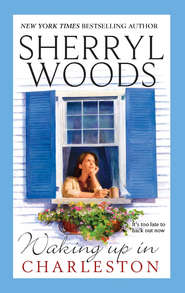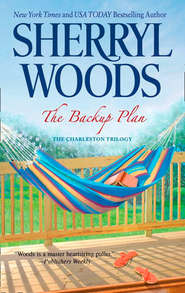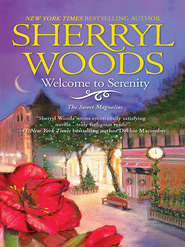По всем вопросам обращайтесь на: info@litportal.ru
(©) 2003-2024.
✖
Flowers on Main
Автор
Год написания книги
2019
Настройки чтения
Размер шрифта
Высота строк
Поля
Flowers on Main
Sherryl Woods
When her last two plays are dismal failures and her relationship with her temperamental mentor falls apart, writer Bree O'Brien abandons Chicago and the regional theater where she hoped to make a name for herself to return home. Opening Flowers on Main promises to bring her a new challenge and a new kind of fulfillment. But not all is peaceful and serene in Chesapeake Shores, with her estranged mother on the scene and her ex-lover on the warpath. Jake Collins has plenty of reasons to want Bree out of his life, but none of those are a match for the one reason he wants her to stay: he's still in love with her.Jake might be able to get past that old hurt if he knew Bree was home to stay, but is she? The only way to know for sure is to take a dangerous leap of faith.
Acclaim for New York Times bestelling author
Sherryl Woods
‘Sherryl Woods always delights her readers— including me!’ —No. 1 New York Times bestselling author Debbie Macomber
‘Compulsively readable … Woods’s novel easily rises
above hot-button topics to tell a universal tale
of friendship’s redemptive power.’
—Publishers Weekly on Mending Fences
‘Sherryl Woods always delivers a fast, breezy … romance.’
—Jayne Ann Krentz
‘Sherryl Woods gives her characters depth, intensity,
and the right amount of humour.’
—RT Book Reviews
‘Sherryl Woods is a uniquely gifted writer whose deep
understanding of human nature is woven
into every page.’
—Carla Neggers
Dear Friends,
Welcome back to Chesapeake Shores and the tightly knit, if far-flung, O’Brien family. If you read The Inn at Eagle Point, you know it’s going to take a lot to get these folks back together and there’s nothing I like more than trying to reunite a dysfunctional family.
This time you’ll get to know Bree, the middle sister, whose career as a playwright at a regional theatre in Chicago started so brightly. Now, though, she’s returned to Chesapeake Shores, her heart in tatters and her spirit wounded. But being back home among family and friends isn’t as serene as she’d been hoping, because in order to build a future she needs to confront her past.
I’m sure every woman would like to have a past as sexy, headstrong and amazing as landscaper Jake Collins, but few of us would like to deal with the kind of complications that have torn him and Bree apart. And, as if their struggles to find their way back to each other aren’t complicated enough, Bree’s mother, Megan, and her father, Mick O’Brien, are busy sorting out their own very contentious relationship under the watchful eye of everyone in the family and in Chesapeake Shores.
I hope you enjoy meeting more of the residents of this wonderful seaside community. Enjoy this visit and plan to come back again. The welcome mat is always out.
Flowers on Main
A Chesapeake Shores novel
Sherryl Woods
www.mirabooks.co.uk (http://www.mirabooks.co.uk)
1 _____
Bree O’Brien sank her fingers into the rich, dark soil and lifted up a handful so she could breathe in the scent of it. This was real, not like the shallow world in which she’d been struggling to make a name for herself for the past six years. Gardening was something she understood. Plants could be coaxed along with water and fertilizer and loving attention in ways that a theater production could not. A vase of flowers, artfully arranged, had only to please the recipient, not an entire audience, each of them a critic in one way or another.
She’d been relieved when her sister Abby had called her about the opening of the Inn at Eagle Point, now owned by their sister Jess. It had given her the perfect excuse to flee Chicago, where her last play had been savaged by the critics and closed a mere week after it had opened. In six years she’d had one regional theater triumph and two box-office and critical disasters.
Some playwrights might be thrilled to have just one big success, even far, far off Broadway, but Bree had always wanted more. She’d expected to be up there with Neil Simon, Noel Coward … heck, even Arthur Miller. Of course, that had been after her first success, when she was way too full of herself. She’d thought herself capable of Simon’s comedic timing, Coward’s wit and Miller’s complex dramatic skill. There’d even been a few critics who’d shared that opinion.
That had made it all the more humbling when the second play had received only lukewarm praise and a shortened one-month run. The third had been skewered by those very same critics who’d sung her praises earlier. Her first play was suddenly being called a fluke. More than one suggested she was washed up at the age of twenty-seven.
She’d been relieved that no one in the family had been in Chicago for the play’s opening to witness her downfall or to see the reviews that had followed. She wouldn’t have been able to bear watching them struggle to be supportive. It was awful enough that everyone at the theater had been a part of the most humiliating moment of her career. None of the actors had even been able to look her in the eye as the director—her lover, for goodness’ sake—had read review after scathing review at the opening-night party before finally crumpling up the papers and tossing them in the trash.
One of these days, she supposed she’d muster up enough confidence to sit down in front of her computer and try again, but for now she was happy to be back in Chesapeake Shores, in familiar surroundings, with her family fussing over her just because they loved her and not because they knew her life was in shambles. She’d needed girl time with her sisters, a rousing game of tag football and nonstop teasing with her brother Connor and his buddies, and a chance to hug her nieces—Abby’s twin daughters.
She’d needed to be back home even more than she’d realized, back in her old room where the only writing she’d ever done was in her diary or stories and plays written for her own satisfaction and no one else’s eyes.
What she’d also needed, but hadn’t admitted to a soul, was distance between herself and acclaimed playwright and director Martin Demming, a mentor for a time, a lover even longer. Lately, though, the relationship hadn’t been working. Maybe she was already raw and overly sensitive after those vicious reviews, but it seemed to her he’d taken an almost gloating satisfaction in her failure. She hadn’t been prepared for that.
So, here she was, three weeks after the opening of Jess’s inn, kneeling in her grandmother’s garden, yanking out weeds and letting the warmth of the sun soak into her bare and protectively sunscreened shoulders. For the first time in months, the tension that knotted there had finally eased. She felt … She searched for the right word, then realized it was content. She felt content with herself, even with her life, despite the current upheaval. She couldn’t recall the last time she’d felt that way.
Oblivious for now to all the warnings about sun damage and Marty’s constant and annoying admonitions about ruining her pale-as-Irish-cream complexion, she turned her face up to the sun and felt it ease the headache that came whenever she thought about the life she’d left behind.
Even as the thought surfaced, her hands stilled and she gasped slightly. Had she left it behind? All of it? Chicago? The theater? The writing? Marty? Had she really left it forever? Could she uproot herself from the world that had meant everything just a few short months ago? Was that what she was doing here, on her knees in the dirt, days after she was supposed to return to the life she’d always dreamed of? Was she giving up? Hiding out? Or merely licking her wounds before going back into the battle zone once again?
And that’s what it was, Bree realized, a battle zone, with way too many potential enemies—the producer, the director, the actors, the critics and the public, all of whom had their own views on what her work was or ought to be. Some days everything came together in an amazing collaboration. At other times, it was a highly charged emotional war with all of her carefully crafted words, scenes and motivations picked apart by those who thought they knew best.
She sat back and heaved a sigh. Oh, how she wished she had an answer to any of those questions.
“You’ve pulled up three of my summer phlox,” Gram said, a clucking note of disapproval in her voice as she interrupted Bree’s dark thoughts. “Do you want to tell me what’s on your mind before you ruin the perennial garden I’ve spent years cultivating?”
Bree looked from her grandmother—hands on hips, petite and feisty in her straw gardening hat, sneakers and bright-pink cropped pants and matching blouse—to the tall, dark purple phlox already wilting amid the weeds she’d tossed aside to her left. At the sight of the flowers, she groaned. “I got the roots. I’ll put them back in the ground with some extra water and fertilizer. They’ll be okay, Gram.”
Gram gave her a penetrating look that suggested she knew exactly what was going on with Bree, but was waiting for her to bring up the subject.
“Can you say the same for yourself?” Gram asked. “Will you be okay?”
Bree deliberately looked away and turned her attention to replanting the phlox. “I have a lot on my mind,” she murmured, afraid that she would confirm Gram’s suspicions if she said more. Of everyone in the family, only her grandmother seemed to truly understand her, to see inside her heart even when Bree was silent. To her father and even to her outgoing siblings, she was mostly an enigma.
“Your distraction’s plain enough,” Gram agreed. “What you need is to share some of it, make the burden a wee bit lighter. If you don’t want to tell me whatever’s on your mind, go over to the inn and have lunch with Jess or call Abby. She’d be happy to take you to lunch in Baltimore, I’m sure. She can show off that new office of hers. You can have a nice heart-to-heart chat.”
“Jess has her hands full. She doesn’t have time to listen to me moan and groan. The same with Abby. Now that she and Trace are engaged and she’s commuting to Baltimore practically every day, she has little enough time for herself and the twins without wasting it on me.”
“Nonsense! Either one of them would make the time, because they’re your sisters,” Gram said impatiently. “With the O’Briens, family comes first. We stick together no matter what. Didn’t I teach you that years ago?”
She’d certainly tried, Bree recalled. It had been a hard lesson to learn after their mother had taken off for New York, fed up with their father’s endless round of business trips and his neglect of their family. Gram had been the glue that held the rest of them together. She’d been the one who’d tried to nudge them into making peace with Megan on her visits home, encouraged them to keep an open mind toward their mother. Not that any of them had. They were young and unforgiving, and the complexities of their parents’ relationship had eluded them.
Sherryl Woods
When her last two plays are dismal failures and her relationship with her temperamental mentor falls apart, writer Bree O'Brien abandons Chicago and the regional theater where she hoped to make a name for herself to return home. Opening Flowers on Main promises to bring her a new challenge and a new kind of fulfillment. But not all is peaceful and serene in Chesapeake Shores, with her estranged mother on the scene and her ex-lover on the warpath. Jake Collins has plenty of reasons to want Bree out of his life, but none of those are a match for the one reason he wants her to stay: he's still in love with her.Jake might be able to get past that old hurt if he knew Bree was home to stay, but is she? The only way to know for sure is to take a dangerous leap of faith.
Acclaim for New York Times bestelling author
Sherryl Woods
‘Sherryl Woods always delights her readers— including me!’ —No. 1 New York Times bestselling author Debbie Macomber
‘Compulsively readable … Woods’s novel easily rises
above hot-button topics to tell a universal tale
of friendship’s redemptive power.’
—Publishers Weekly on Mending Fences
‘Sherryl Woods always delivers a fast, breezy … romance.’
—Jayne Ann Krentz
‘Sherryl Woods gives her characters depth, intensity,
and the right amount of humour.’
—RT Book Reviews
‘Sherryl Woods is a uniquely gifted writer whose deep
understanding of human nature is woven
into every page.’
—Carla Neggers
Dear Friends,
Welcome back to Chesapeake Shores and the tightly knit, if far-flung, O’Brien family. If you read The Inn at Eagle Point, you know it’s going to take a lot to get these folks back together and there’s nothing I like more than trying to reunite a dysfunctional family.
This time you’ll get to know Bree, the middle sister, whose career as a playwright at a regional theatre in Chicago started so brightly. Now, though, she’s returned to Chesapeake Shores, her heart in tatters and her spirit wounded. But being back home among family and friends isn’t as serene as she’d been hoping, because in order to build a future she needs to confront her past.
I’m sure every woman would like to have a past as sexy, headstrong and amazing as landscaper Jake Collins, but few of us would like to deal with the kind of complications that have torn him and Bree apart. And, as if their struggles to find their way back to each other aren’t complicated enough, Bree’s mother, Megan, and her father, Mick O’Brien, are busy sorting out their own very contentious relationship under the watchful eye of everyone in the family and in Chesapeake Shores.
I hope you enjoy meeting more of the residents of this wonderful seaside community. Enjoy this visit and plan to come back again. The welcome mat is always out.
Flowers on Main
A Chesapeake Shores novel
Sherryl Woods
www.mirabooks.co.uk (http://www.mirabooks.co.uk)
1 _____
Bree O’Brien sank her fingers into the rich, dark soil and lifted up a handful so she could breathe in the scent of it. This was real, not like the shallow world in which she’d been struggling to make a name for herself for the past six years. Gardening was something she understood. Plants could be coaxed along with water and fertilizer and loving attention in ways that a theater production could not. A vase of flowers, artfully arranged, had only to please the recipient, not an entire audience, each of them a critic in one way or another.
She’d been relieved when her sister Abby had called her about the opening of the Inn at Eagle Point, now owned by their sister Jess. It had given her the perfect excuse to flee Chicago, where her last play had been savaged by the critics and closed a mere week after it had opened. In six years she’d had one regional theater triumph and two box-office and critical disasters.
Some playwrights might be thrilled to have just one big success, even far, far off Broadway, but Bree had always wanted more. She’d expected to be up there with Neil Simon, Noel Coward … heck, even Arthur Miller. Of course, that had been after her first success, when she was way too full of herself. She’d thought herself capable of Simon’s comedic timing, Coward’s wit and Miller’s complex dramatic skill. There’d even been a few critics who’d shared that opinion.
That had made it all the more humbling when the second play had received only lukewarm praise and a shortened one-month run. The third had been skewered by those very same critics who’d sung her praises earlier. Her first play was suddenly being called a fluke. More than one suggested she was washed up at the age of twenty-seven.
She’d been relieved that no one in the family had been in Chicago for the play’s opening to witness her downfall or to see the reviews that had followed. She wouldn’t have been able to bear watching them struggle to be supportive. It was awful enough that everyone at the theater had been a part of the most humiliating moment of her career. None of the actors had even been able to look her in the eye as the director—her lover, for goodness’ sake—had read review after scathing review at the opening-night party before finally crumpling up the papers and tossing them in the trash.
One of these days, she supposed she’d muster up enough confidence to sit down in front of her computer and try again, but for now she was happy to be back in Chesapeake Shores, in familiar surroundings, with her family fussing over her just because they loved her and not because they knew her life was in shambles. She’d needed girl time with her sisters, a rousing game of tag football and nonstop teasing with her brother Connor and his buddies, and a chance to hug her nieces—Abby’s twin daughters.
She’d needed to be back home even more than she’d realized, back in her old room where the only writing she’d ever done was in her diary or stories and plays written for her own satisfaction and no one else’s eyes.
What she’d also needed, but hadn’t admitted to a soul, was distance between herself and acclaimed playwright and director Martin Demming, a mentor for a time, a lover even longer. Lately, though, the relationship hadn’t been working. Maybe she was already raw and overly sensitive after those vicious reviews, but it seemed to her he’d taken an almost gloating satisfaction in her failure. She hadn’t been prepared for that.
So, here she was, three weeks after the opening of Jess’s inn, kneeling in her grandmother’s garden, yanking out weeds and letting the warmth of the sun soak into her bare and protectively sunscreened shoulders. For the first time in months, the tension that knotted there had finally eased. She felt … She searched for the right word, then realized it was content. She felt content with herself, even with her life, despite the current upheaval. She couldn’t recall the last time she’d felt that way.
Oblivious for now to all the warnings about sun damage and Marty’s constant and annoying admonitions about ruining her pale-as-Irish-cream complexion, she turned her face up to the sun and felt it ease the headache that came whenever she thought about the life she’d left behind.
Even as the thought surfaced, her hands stilled and she gasped slightly. Had she left it behind? All of it? Chicago? The theater? The writing? Marty? Had she really left it forever? Could she uproot herself from the world that had meant everything just a few short months ago? Was that what she was doing here, on her knees in the dirt, days after she was supposed to return to the life she’d always dreamed of? Was she giving up? Hiding out? Or merely licking her wounds before going back into the battle zone once again?
And that’s what it was, Bree realized, a battle zone, with way too many potential enemies—the producer, the director, the actors, the critics and the public, all of whom had their own views on what her work was or ought to be. Some days everything came together in an amazing collaboration. At other times, it was a highly charged emotional war with all of her carefully crafted words, scenes and motivations picked apart by those who thought they knew best.
She sat back and heaved a sigh. Oh, how she wished she had an answer to any of those questions.
“You’ve pulled up three of my summer phlox,” Gram said, a clucking note of disapproval in her voice as she interrupted Bree’s dark thoughts. “Do you want to tell me what’s on your mind before you ruin the perennial garden I’ve spent years cultivating?”
Bree looked from her grandmother—hands on hips, petite and feisty in her straw gardening hat, sneakers and bright-pink cropped pants and matching blouse—to the tall, dark purple phlox already wilting amid the weeds she’d tossed aside to her left. At the sight of the flowers, she groaned. “I got the roots. I’ll put them back in the ground with some extra water and fertilizer. They’ll be okay, Gram.”
Gram gave her a penetrating look that suggested she knew exactly what was going on with Bree, but was waiting for her to bring up the subject.
“Can you say the same for yourself?” Gram asked. “Will you be okay?”
Bree deliberately looked away and turned her attention to replanting the phlox. “I have a lot on my mind,” she murmured, afraid that she would confirm Gram’s suspicions if she said more. Of everyone in the family, only her grandmother seemed to truly understand her, to see inside her heart even when Bree was silent. To her father and even to her outgoing siblings, she was mostly an enigma.
“Your distraction’s plain enough,” Gram agreed. “What you need is to share some of it, make the burden a wee bit lighter. If you don’t want to tell me whatever’s on your mind, go over to the inn and have lunch with Jess or call Abby. She’d be happy to take you to lunch in Baltimore, I’m sure. She can show off that new office of hers. You can have a nice heart-to-heart chat.”
“Jess has her hands full. She doesn’t have time to listen to me moan and groan. The same with Abby. Now that she and Trace are engaged and she’s commuting to Baltimore practically every day, she has little enough time for herself and the twins without wasting it on me.”
“Nonsense! Either one of them would make the time, because they’re your sisters,” Gram said impatiently. “With the O’Briens, family comes first. We stick together no matter what. Didn’t I teach you that years ago?”
She’d certainly tried, Bree recalled. It had been a hard lesson to learn after their mother had taken off for New York, fed up with their father’s endless round of business trips and his neglect of their family. Gram had been the glue that held the rest of them together. She’d been the one who’d tried to nudge them into making peace with Megan on her visits home, encouraged them to keep an open mind toward their mother. Not that any of them had. They were young and unforgiving, and the complexities of their parents’ relationship had eluded them.











